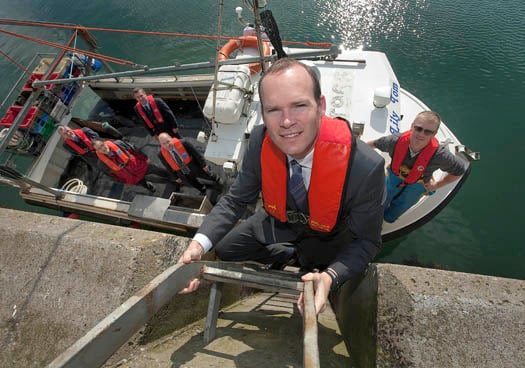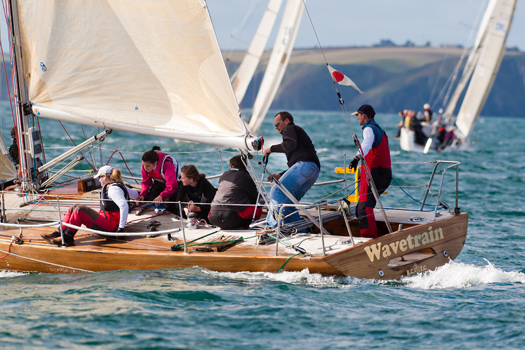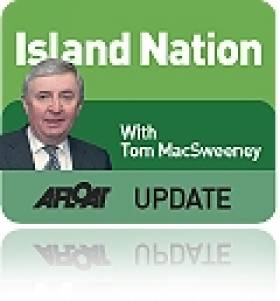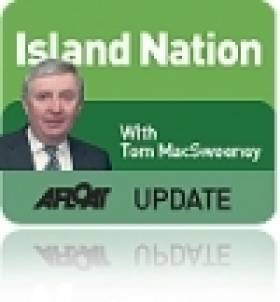Displaying items by tag: Labour
Simon Coveney Appointed Marine Minister
Cork sailor Simon Coveney (38) has been appointed as Minister of Agriculture, Food and Marine in the new cabinet of the Fine Gael/Labour Government formed yesterday.
The announcement has been welcomed by various marine interests pleased to see Marine back at the cabinet for the first time since the Department was dismantled by Fianna Fail's Bertie Ahern in 2002.

Marine Minister Simon Coveney TD
The appointment means Taoiseach Enda Kenny has kept good an election promise to reinstate the Marine department. A decade of lost opportunties has meant the sector has suffered through lack of infrastructure and coastline planning.

Simon Coveney at the helm of his yacht Wavetrain. Photo: Bob Bateman
"Simon is someone who understands the Sea as a sailor himself but also in his work as an MEP where he was involved in a number of major European maritime projects. This is a great opportuinty for the Marine. We look forward to working with him to develop this untapped resource." said David O'Brien of the Irish Marine Federation.
Simon was first elected to the Dáil in 1998 as one of Fine Gael's youngest TD's aged 26. He replaced his father Hugh Coveney TD following his untimely death.
Simon follows his father in to the post of Marine Minister. Hugh held the post in 1994.
Simon holds a B.Sc. in Agriculture and Land Management from Royal Agriculture College, Gloucestershire. He was also educated at Clongowes Wood College, County Kildare; University College Cork, and Gurteen Agricultural College, County Tipperary.
A keen fan of all competitive sport he has worked as a sailing instructor at his club Royal Cork Yacht Club in Crosshaven and been involved in many sailing regattas.
In 1997/8 he led the "Sail Chernobyl Project" which involved sailing a boat 30,000 miles around the world and raising €650,000 for charity.
In 2006 he contributed to RTE's series The Harbour and in a memorable quote, the Cork TD and former MEP said: "When somebody asks me the question, what's the one thing that's special about Cork?, I'd say the harbour."
Programme for Government will Reinstate Marine Department
It maybe the second last item on the programme for government issued by Enda Kenny and Eamon Gilmore yesterday but the indications are good that the marine sector will see a reinstated Department of the Marine. the Fine Gael and Labour coalition say 'marine responsibilities will be merged under one Department, for better co-ordination in policy delivery'. Here is the relevant excerpt:
Coastal communities, fisheries & marine environment
We will negotiate the best possible deal for fishermen in the review of the Common Fisheries Policy.
We will support the development of sustainable aquaculture and fish farms by streamlining the licensing process and reducing associated bureaucracy.
Marine responsibilities will be merged under one Department, for better co-ordination in policy delivery. We will develop an integrated marine and coastal planning process in order to maximise the potential of Ireland's coastline in fishing, aquaculture, ocean energy and tourism.
A Sea Fisheries Sustainability Impact Assessment, based on consultation with all major stakeholders, will be brought before the Dáil annually before EU fisheries negotiations commence.
We will replace criminal sanctions system for minor fisheries offences with administrative sanction system to bring Ireland into line with other European jurisdictions. Safety at sea and decent working conditions must underpin the development of the fisheries sector. We will explore the provision of an emergency towing vessel for the Coastguard.
Will Election Promises Be Delivered On?
Fine Gael can, logically from the support which the party garnered in the General Election, be expected to dominate a Coalition Government. In that context, the question arises as to whether they will deliver on their pre-election manifesto commitment to re-establish the Department of the Marine?
The promise to do so was unequivocal, a clear undertaking that the situation created by the former Fianna Fail and Green Party Coalition which had decimated maritime issues by spreading them over several Departments of State, would be changed and all would be contained in one Department.
In the event of a Coalition being formed will we hear that "circumstances" have changed and adjustments must be made in the context of Coalition arrangements?
I had the opportunity to question Joan Burton of the Labour Party, one of the party negotiators, prior to the election at an event organised by the European Association of Journalists. She accepted that politicians had not paid enough attention to the marine sphere and said that this attitude should be changed and accepted that the nation could benefit economically as a result.
I hope that I am not being overly cynical towards politicians, born of long years of journalistic experience, in fearing that pre-election promises may be subjected to change.
• This article is reprinted by permission of the EVENING ECHO newspaper, Cork, where Tom MacSweeney writes maritime columns twice weekly. Evening Echo website: www.eecho.ieRemembering Seafarers Who Saved the Nation
City Quay in the centre of Dublin can be a cold place when the wind whips upriver from the open sea.
There was a 'bite' in the wind as I stood there in late November last year, recording the sounds of remembrance. Men, women and children stood in front of a monument where, on most days, traffic pours past and the great majority of people in those vehicles may not realise they are passing a hallowed spot which remembers men without whom this nation would have ground to a halt. This nation may be in a state of "economic war" at present, it was in a real state of war when those men died.
Every year, on the second last Sunday of November, this gathering takes place, when the men of the Irish mercantile marine who lost their lives at sea during the Second World War are remembered. Mass is celebrated in the City Quay Parish Church. Then there is a short walk to the Seamen's Memorial where wreaths are laid. That is followed by tea, coffee and a chat in the parish hall where it is a time of memories for former seafarers and their families. Friendships are renewed as the "family of the sea" gathers. In the afternoon, there is another Memorial Service St. Patrick's Cathedral.
These are poignant occasions which, in recent years, have been extended to embrace, remember and honour all Irish seafarers who have died at sea. The Maritime Institute of Ireland organises the event. Its Cork Branch also holds a remembrance service in November.
The month of November is an important one in the history of Irish maritime affairs.
It was on November 14, 1984 that the then Irish Government, a Fine Gael/Labour Coalition delivered a shattering blow to the Irish maritime industry. They put the national shipping company, Irish Shipping, into liquidation.
Those who took that decision have since put distance between themselves and the maritime sector. Garrett Fitzgerald was Taoiseach; Alan Dukes was the Minister for Finance in the Fine Gael/Labour Coalition Government which made that controversial decision, putting the first Irish State company into liquidation. Seafarers who had rallied to the call to help save the nation when the company was set up in World War Two were abandoned to their fate. Politicians did not want to remember that, at a time when neutral Ireland was being denied vital supplies by warring nations, seafarers saved the nation from disaster. The politicians who ruled the nation in 1984 abandoned them.
Shortly after they abandoned Irish Shipping, the Government was quick to rescue Allied Irish Banks and protect shareholders over the consequences of rash investment in insurance. Banks were more important than seafarers. It seems that not a lot has changed today in the attitude the Government takes towards banks, in comparison with the way it treats the people of this island nation.
• The Annual National Commemoration Services for Irish Seafarers will be held at 11.30 am this Sunday, November 21, in the Church of the Immaculate Heart of Mary, City Quay, Dublin. Wreaths will be laid afterwards at the Irish Seaman's National Memorial on City Quay. There will also be a memorial ceremony of Evensong at 3.15 pm in St. Patrick's Cathedral, Dublin.
• This article is reprinted by permission of the EVENING ECHO newspaper, Cork, where Tom MacSweeney writes maritime columns twice weekly. Evening Echo website: www.eecho.ie
READ MORE ISLAND NATION BLOGS HERE
































































